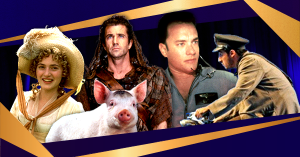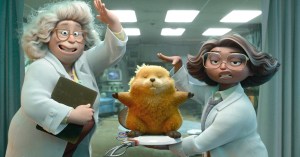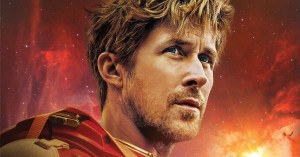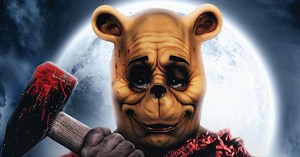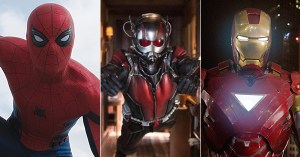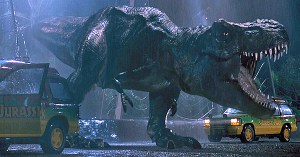Total Recall: Drew Barrymore’s Best Movies
We count down the best-reviewed work of the Going the Distance star.
No matter how talented they are, most child stars have a hard time making the jump to grown-up roles — and Drew Barrymore, with a pair of rehab stints under her belt before she was old enough to drive, initially seemed to be having a harder go of it than most. But Barrymore’s turbulent youth was just the beginning of a career that has seen her starring in, producing, and even directing some of the most successful films of the last 20 years (not to mention one of the most memorable cameos, courtesy of Scream). With Going the Distance arriving in theaters this weekend, Barrymore is poised to add to her already-impressive $1.5 billion lifetime gross, so we thought now would be the perfect time to take a look back at the brightest critical highlights. It’s time for Total Recall!
10. The Wedding Singer
A Valentine’s Day romantic comedy with unusually broad appeal, The Wedding Singer offered lonely hearts a chance to cheer along with a jilted (and profanely enraged) Adam Sandler — while still making room for a sweet love story and plenty of vintage 1980s hits on the soundtrack. As mulleted wedding singer Robbie Hart, Sandler proved he was capable of more than the belligerent man-child of Billy Madison and Happy Gilmore; as the doe-eyed cocktail waitress Julia Sullivan, Barrymore was at her most effortlessly charming. A formula picture? Sure. But that was enough for critics like the Globe and Mail’s Liam Lacy, who sighed, “Finally, an Adam Sandler comedy that you can sit through without wanting to throw a mallet through the screen.”
9. Charlie’s Angels
A cheerfully undemanding blockbuster that knows where its popcorn is buttered, Charlie’s Angels was part of an early string of successes for Drew Barrymore’s Flower Films, racking up almost $265 million in worldwide grosses with a savvy blend of stylish action thrills and winking T&A. Throw Barrymore, Cameron Diaz, and Lucy Liu in some skintight fashion, add a bunch of McG-directed set pieces, and you’ve got yourself an essentially critic-proof movie — but most critics were surprisingly kind to these Angels anyway, including James Berardinelli of ReelViews, who surmised, “You’d have to be a hopeless curmudgeon not to be entertained on some juvenile level by this motion picture.”
8. Stephen King’s Cat’s Eye
A year after scoring the title role in the adaptation of Stephen King’s Firestarter, Barrymore reunited with the bestselling horror author for Cat’s Eye, which ties together three of his short stories with the misadventures of a stray cat. Barrymore appeared in the film’s final segment, “The General,” about a girl whose nighttime routine is complicated by the evil designs of a dagger-wielding troll. It sounds a little silly, and it wasn’t a huge hit, but Cat’s Eye has become something of a cult film over time — and it had its defenders while it was in theaters, among them Roger Ebert, who wrote, “Stephen King seems to be working his way through the reference books of human phobias, and Cat’s Eye is one of his most effective films.”
7. Boys on the Side
Sort of a power trio version of Thelma & Louise, 1995’s Boys on the Side united Barrymore with Whoopi Goldberg and Mary-Louise Parker for a dramedy that incorporated modern themes (sexuality, gender roles, domestic violence) with the old-school craft of director Herbert Ross (Funny Lady, Footloose). While it wasn’t an enormous hit at the box office, it was generally well-received by critics — including Janet Maslin of the New York Times, who wrote, “Despite ads that present it as a giddy romp, Boys on the Side actually proves to be a wistful romance, a sardonic comedy, a Thelma, Edna and Louise tale of sisterly solidarity, and finally a sad, wrenching story that brings Terms of Endearment to mind.”
6. Confessions of a Dangerous Mind
Was Chuck Barris a secret assassin for the CIA, or just a game show pioneer with an overactive imagination? We’ll probably never know for sure, but the truth matters less than the fact that Barris wrote a wildly entertaining autobiography about his version of events, inspiring screenwriter Charlie Kaufman to adapt it for the screen in 2002. George Clooney made his directorial debut with Confessions of a Dangerous Mind, which starred Sam Rockwell as Barris and Drew Barrymore as his long-suffering girlfriend Penny Pacino; like many of Barris’ ideas for television shows, it was destined to sail over the heads of mainstream audiences — and become a cult favorite for fans of flawed, off-kilter entertainment. Among the many critics who appreciated Confessions was Andrew Sarris of the New York Observer, who decreed, “Mr. Clooney, Mr. Kaufman and all their collaborators are entitled to take a deep bow for fashioning an engrossing entertainment out of an almost sure-fire prescription for a critical and commercial disaster.”
5. Everyone Says I Love You
A Woody Allen musical — starring actors not known for their singing voices? It could have been another misfire from Allen’s scattershot 1990s filmography, but Everyone Says I Love You ended up going down as one of the director’s more satisfying — and surprising — critical triumphs. A winsome romantic comedy that boasts glamorous locations (New York, Venice, and Paris) to match its ensemble cast (Julia Roberts, Ed Norton, and Natalie Portman, to name just a few), Everyone made the most of its stars’ often pedestrian vocal skills — all except Barrymore, who was dubbed; her singing apparently fell short of the limited standards set by Roberts, Norton, and Allen himself. It was all part of the charm for critics like the Boston Phoenix’s Gary Susman, who called the movie “an odd mix of old and new, realism and fantasy, craft and amateurism that shouldn’t work but is inventive and hilarious anyway.”
4. Donnie Darko
Perhaps the definitive cult film of the 21st century, Richard Kelly’s Donnie Darko may not have been made at all if not for Drew Barrymore, who assisted its bumpy passage to theaters by releasing the twisty time-traveling thriller as a Flower Films production. Starring Jake Gyllenhaal as a troubled teen who may or may not have the power to save the universe, and featuring a wildly eclectic supporting cast that included Barrymore, Patrick Swayze, Ashley Tisdale, Seth Rogen, and Noah Wyle, Darko was probably destined to end its theatrical run with a whimper — but nearly a decade after its release, its stature has grown to match the applause of critics like Salon’s Andrew O’Hehir, who called it “A stunning technical accomplishment that virtually bursts with noise, ideas and references.”
3. Whip It
Barrymore cut her teeth as a producer in the 1990s, releasing hits (like Never Been Kissed and Charlie’s Angels) and passion projects (like Donnie Darko) through her Flower Films banner, but it wasn’t until 2009’s Whip It that she made her directorial debut. Adapted by Shauna Cross from her novel Derby Girl, Whip It follows the journey of disgruntled beauty queen Bliss Cavendar (Ellen Page) as she discovers her love for roller derby as a member of the Hurl Scouts, a team of perennial losers whose ranks include lovable misfits like Maggie Mayhem (Kristen Wiig) and Smashley Simpson (Barrymore). A minor commercial success, Whip It earned the affection of critics like Mary Pols of Time Magazine, who wrote, “Even if a tale of female empowerment through roller derby is not your particular cup of tea, Barrymore delivers it with such a giddy good sense of fun that it’s easy enough to go along with.”
2. Ever After – A Cinderella Story
Blending a timeless tale with modern music and a post-feminist twist, Andy Tennant’s Ever After helped cement Drew Barrymore’s grip on the box office in 1998 — between this $65 million summer hit and the runaway success of The Wedding Singer in the spring, it was the Year of Drew. Ever After was a sizable critical hit, too, thanks to a sharp screenplay, its solid cast (Anjelica Huston as the evil stepmother? Gold) and the classic source material that inspired it. As Lisa Schwarzbaum applauded for Entertainment Weekly, “A Cinderella without mice as coachmen … had better have a mighty fine excuse for tampering with a successful formula. Against many odds, Ever After comes up with a good one.”
1. E.T. – The Extra-Terrestrial
No surprises here, right? A modern classic that added another jewel to Spielberg’s crown, earned nine Oscar nominations, and created millions of Reese’s Pieces fans, E.T. the Extra-Terrestrial also launched Drew Barrymore’s career in earnest. Although she’d been in commercials and films before (most notably a small supporting role in Altered States), Barrymore shone in E.T.; thanks to her preternatural screen presence and the great lines handed to her character by Melissa Mathison’s script, she walked away from the movie a certified star. Although the films that immediately followed weren’t always successful (including Firestarter and Irreconcilable Differences), it’s still easy to look back at E.T. and see the talent that would eventually help make Barrymore one of Hollywood’s most bankable talents — and to see why the world fell in love with the story of a lonely young boy and his lost alien friend. As Anthony Lane wrote for the New Yorker, “We have yet to recover from [Spielberg’s] revelation: that there is nothing more real than sitting in your own back yard — waiting for the unreal to come down, take a handful of candy, and fly you to the moon.”
In case you were wondering, here are Barrymore’s top 10 movies according RT users’ scores:
1. Ever After – A Cinderella Story — 81%
2. Donnie Darko — 77%
3. The Wedding Singer — 76%
4. Whip It — 73%
5. Confessions of a Dangerous Mind — 71%
6. Music and Lyrics — 70%
7. Never Been Kissed — 70%
8. 50 First Dates — 68%
9. E.T. – The Extra-Terrestrial — 65%
10. Boys on the Side — 65%
Take a look through Barrymore’s complete filmography, as well as the rest of our Total Recall archives. And don’t forget to check out the reviews for Going the Distance.
Finally, here’s Barrymore sharing the screen with a key early collaborator — the Pillsbury Doughboy:

